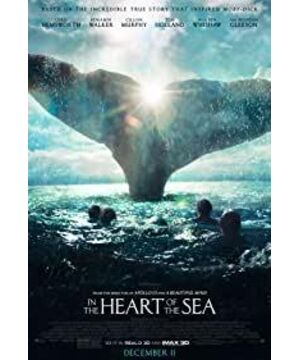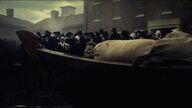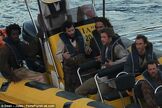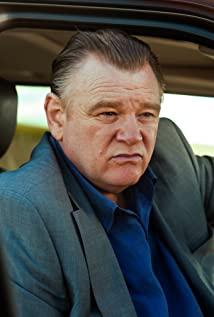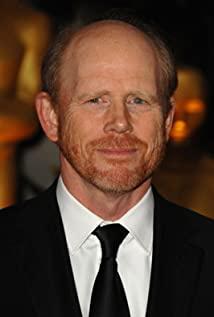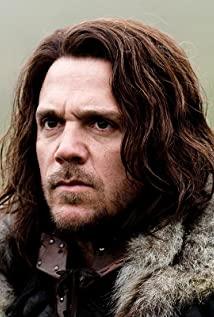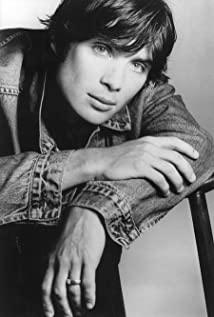The most nervous part of this film started when a group of people were hanging by a thread.
Escaped in three small boats, and was attacked by a giant whale in the middle. There was only a compass, and the land was not visible for a long time. Therefore, when they were about to reach the small island in the sea, even if they were attacked by a giant whale again, most of the people survived in the end. At that time, I thought that only the memoir survived here, but I survived a lot, which instantly diluted my pessimism (I thought the memoir was the captain, and thought that he was the only one who survived in the fleet) .
However, they soon discovered that this was a small island of death, because many people once died on the island because they hadn't waited for rescue for a long time. There was not much food or even a compass, but they could only wait to die. They finally decided to go out to find hope of survival, with their pitiful supplies. The dude with his head bruised and a few people stayed. The deputy captain said that when they arrived, they would come back to pick up the dude. That was the true separation of life and death. Waiting on an empty stomach, and suffocating one's breath to escape from the bottom of the sea, what is the difference?
Soon, a black crew member died. The deputy captain said that at this time, it would be irrational to throw away anything that might be of use to us! Rare reason, but how terrible. In the end, the only hard biscuits were gone. When the lottery was drawn to determine who died, the captain was drawn, but the prisoner chose to commit suicide. In his eyes, there is no spiritual hope that is more desperate than physical death.
In order to take care of our emotions, the director reappeared when they saw the birds and the edge of the land, not when they had no hope at all. The deputy captain did not choose to attack the giant whale this time, he believed that all this was caused by their greed. In the end, the people on both ships were rescued, while they were dying.
I asked myself why this paragraph made me nervous unconsciously. Because, as a person, I can easily understand what it is like to face death and despair. This story tells something that will not happen to us, but it makes us feel the same.
The most touching point is actually: the cruelty of reason.
In order to survive, we agreed with the injured teammates to stay on the island; in order to survive, we ate the bodies of our dead companions. Cruel, but rational. Cruelty is because it does not conform to the kindness and friendliness taught to us by religion, morality, etc.; rationality is because that is the best way to survive in that environment.
Here is an episode. Is there no such cruel reason in our daily life? Of course there is, otherwise we would not have such a big resonance. Your good partner violated your promise, but then compensated you through other channels. He said that he had to do that. It's just that the degree of cruelty is different. Only when they make us painful, we will notice it.
However, the movie did not stop at cruelty.
Halfway through, the deputy captain wondered whether we were too greedy or the whales were too difficult to deal with. In fact, in the whole film, only the giant whale has fought back, the other whales are just waiting to be captured, and the giant whale fights back only by knocking the ship over, what will happen to the shark? Finally, when there was still a chance to attack the giant whale, the deputy captain did not start. Yes, the whole process of surviving has been very difficult. Why is it so hard? Our greed is the first, and it is our greed that sets itself up. If we don’t use whale oil as fuel, we won’t be gambled to kill whales; if we stop after catching the first whale, they won’t encounter giant whales. The reaction of the giant whale-it is all about to catch it with pride).
Fuel has changed our lives drastically, and we can't stop it. To improve our quality of life, we need a lot of fuel. From this perspective alone, I can't find any logical problems. It's just that, as people who enjoy "high-quality life", there are too many bloody scenes that don't know how to get fuel. This bloody, in the end, was only for the crew and businessmen to bear-the crew exchanged hard work for remuneration, and the businessmen exchanged ignorance for huge profits.
We "common people" trade invisible to "high-quality life."
This is the source of why this ethical issue has never been resolved, and people have continued to walk on the "evil gold rush". This is because the "common people", who account for 99.99% of the total population, are unwilling to give up "a high-quality life." At the end of the film, it is nothing more than replacing whale oil with oil, which is what people grabbed.
Perhaps the film provides a way of thinking:
when we begin to examine our own greed, God forgive us and gave us a way out. Although grabbing oil is also a crazy behavior, it is a huge improvement compared to endless whaling. Because we are only created by God in his own shadow, we are not God after all, and the greedy pursuit of a "high-quality life" cannot be eradicated. Then we can only accept this kind of self. What we can do is to let ourselves go along and create a "high-quality life" for ourselves at the lowest possible cost. This effort may be the source of our human civilization.
View more about In the Heart of the Sea reviews


